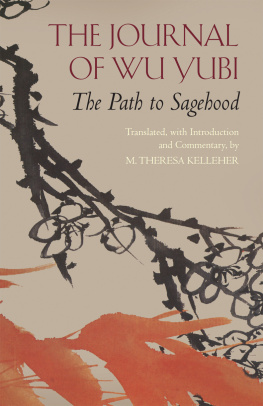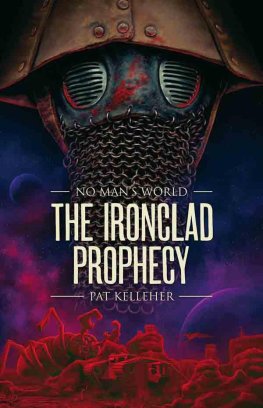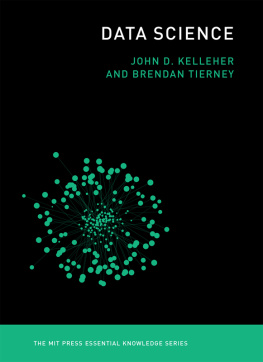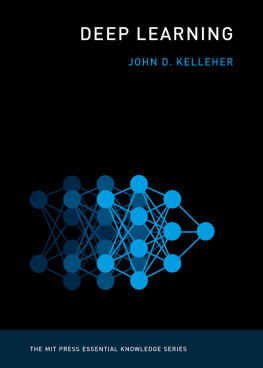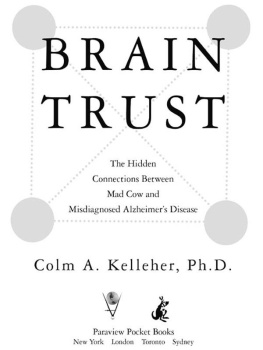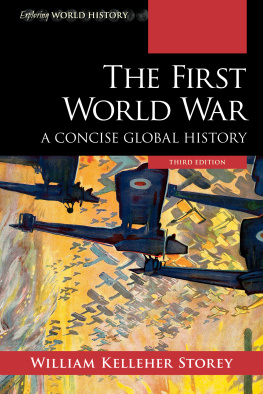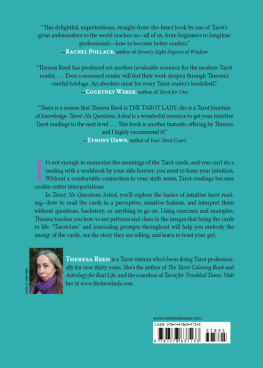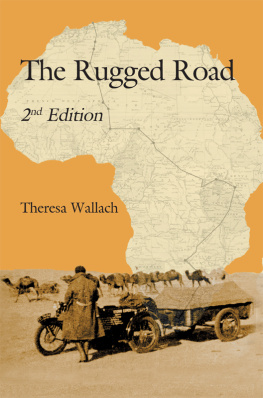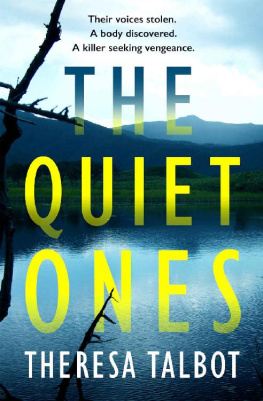Kelleher M. Theresa - The journal of Wu Yubi: the path to sagehood
Here you can read online Kelleher M. Theresa - The journal of Wu Yubi: the path to sagehood full text of the book (entire story) in english for free. Download pdf and epub, get meaning, cover and reviews about this ebook. City: Indianapolis, year: 2013, publisher: Hackett Publishing Company, Incorporated, genre: Detective and thriller. Description of the work, (preface) as well as reviews are available. Best literature library LitArk.com created for fans of good reading and offers a wide selection of genres:
Romance novel
Science fiction
Adventure
Detective
Science
History
Home and family
Prose
Art
Politics
Computer
Non-fiction
Religion
Business
Children
Humor
Choose a favorite category and find really read worthwhile books. Enjoy immersion in the world of imagination, feel the emotions of the characters or learn something new for yourself, make an fascinating discovery.
- Book:The journal of Wu Yubi: the path to sagehood
- Author:
- Publisher:Hackett Publishing Company, Incorporated
- Genre:
- Year:2013
- City:Indianapolis
- Rating:5 / 5
- Favourites:Add to favourites
- Your mark:
- 100
- 1
- 2
- 3
- 4
- 5
The journal of Wu Yubi: the path to sagehood: summary, description and annotation
We offer to read an annotation, description, summary or preface (depends on what the author of the book "The journal of Wu Yubi: the path to sagehood" wrote himself). If you haven't found the necessary information about the book — write in the comments, we will try to find it.
The journal of Wu Yubi: the path to sagehood — read online for free the complete book (whole text) full work
Below is the text of the book, divided by pages. System saving the place of the last page read, allows you to conveniently read the book "The journal of Wu Yubi: the path to sagehood" online for free, without having to search again every time where you left off. Put a bookmark, and you can go to the page where you finished reading at any time.
Font size:
Interval:
Bookmark:

Translated, with Introduction and Commentary, by
M. T HERESA K ELLEHER
Indianapolis/Cambridge
Copyright 2013 by Hackett Publishing Company, Inc.
All rights reserved
Printed in the United States of America
16 15 14 13 1 2 3 4 5 6 7
For further information, please address
Hackett Publishing Company, Inc.
P.O. Box 44937
Indianapolis, Indiana 46244-0937
www.hackettpublishing.com
Cover design by Abigail Coyle
Interior design by Elizabeth L. Wilson
Composition by Graphic Composition, Inc., Bogart, Georgia.
Library of Congress Cataloging-in-Publication Data
Wu, Yubi, 13911469.
[Kangzhai xian sheng ri lu. English]
The journal of Wu Yubi : the path to sagehood / translated, with introduction and commentary, by Theresa Kelleher.
p. cm.
Includes bibliographical references.
ISBN 978-1-62466-042-9 (pbk.) ISBN 978-1-62466-043-6 (cloth)
1. Wu, Yubi, 13911469Diaries. 2. ConfucianistsChinaDiaries. 3. Neo-Confucianism. I. Kelleher, M. Theresa, 1949- II. Title. III. Title: Path to sagehood.
B128.W844A3 2013
| 181.112dc23 | 2013017628 |
ePub ISBN: 978-1-62466-702-2
For Charlie and Clare
Shen Fu, Six Records of a Life Adrift. Translated, with Introduction and Notes, by Graham Sanders.
Michael Loewe, Bing: From Farmers Son to Magistrate in Han China.
Sarah Schneewind, A Tale of Two Melons: Emperor and Subject in Ming China.
The early days of May this year have been unusually beautiful, with crystal clear blue skies and lush blossoming of cherry trees and dogwood. A few mornings ago, as I was sipping my breakfast tea and watching the birds at our feeder, I found these lines of Wu Yubi coming to me: Today, the twenty-eighth day of the second month, is such a beautiful, clear day. I have been composing poetry in my outer southern studio. The sunlight reflecting through the mountain mist shines on the flowers and trees, while birds flutter up and down in song. What a joyful mood Im in! (entry no. 26). There he was again, making his way into my mind as he has done so often. He and I go a long ways back, to my graduate school days at Columbia University in New York City in the late 1970s and early 1980s. We kept steady company for several years, as I worked to translate his Journal to fulfill the requirements for my doctorate. I was drawn to his open confessional manner.
In the years after graduating, I continued some work on his Journal. When the journal auto:/biography had a special issue dedicated to the theme of Autobiography and Mysticism (Vol. 6, no. 2, Fall 1991), I contributed a piece, Writing Ones Way to Sagehood: WuY-pi and his Journal. Around the same time, I presented a paper (still unpublished) on The Use of Religious Diaries in Self-Cultivation: The Case of WuY-pi, that included comparisons with Baptist and Quaker diaries of sixteenth-century England.
But other research interests (educational texts for women, childrens education, Catholic nuns working with Hakka women in early twentieth-century China), a full teaching load, and family life consumed my time and Wu was left behind on the shelf. He, however, was never completely absent from my life. Students and I pored over his writings in the photocopies I made of my translations. And every once in a while, one of his lines would just come to me, often at the oddest times. (The most frequent being, Difficulties I am willing to accept as part of life, / But I never thought they would be as extreme as this! entry 153.)
{x} Several years ago, I finally decided that I really must give Wu the full treatment in book form that he deserved. It has taken me a long time to complete the bookI am more of a turtle than a hare (our family has a thing for turtles; my daughter is training to be a herpetologist). I hope the reader will find Wu as engaging as I have. What I have discovered is that readers react to him along a spectrum of two extremes: some cannot tolerate his negative complaining and find him an incredible whiny bore; others are moved by what they regard as his wonderfully sensitive soul. There are grounds for both reactions. The value I have found of using it in a classroom is that students are given the chance to respond to him first hand, as they will, and also to see that the people trying to put Confucianism into practice were ordinary human beings like themselves.
Before proceeding, I would like to pay tribute to the sage models of my past, those who shaped my intellectual life and inspired my understanding of Confucianism. The first is Thomas Berry, my uncle, who started me on my way in Asian Studies. Next are the outstanding scholars at Columbia University that I had the privilege of studying with, most especially Wm. Theodore de Bary, Wing-tsit Chan, Pei-yi Wu, and Irene Bloom. My debt of gratitude to all of them is immeasurable.
I also wish to express my deep gratitude to Deborah Wilkes, my editor at Hackett, who has been so patient and supportive of me in seeing this book through to its completion. I owe a lot to the steady encouragement she has extended to me over the past two years. I also want to thank Liz Wilson who has overseen the production end of this book, and who too has shown great patience with me.
1. I use the pinyin system of romanization throughout the book. The one change I make is to hyphenate two-character Chinese terms, instead of putting them together as what appears to be one word. For example: fu-ren, instead of furen. When it comes to book titles, however, I do not hyphenate.
2. Because much of the material on Neo-Confucianism was done with the Wade-Giles system of romanization, to help the reader convert the names of people and books according to that system, {xi} I have provided sections in each glossary that convert them into their pinyin rendering.
3. Chinese scholars usually had at least three names. For the sake of simplicity, I refer to each only by one name. Take the case of Zhu Xi, for instance. Wu refers to him by several of Zhus names, but I refer to him as Zhu Xi all the time.
4. Unless otherwise indicated, all translations from Chinese texts are my own.
In most general studies of Neo-Confucianism, the focus tends to be on the leading thinkers of the Song (9601279) and Ming (13681644) dynasties, such as the Cheng brothers (Cheng Hao and Cheng Yi), Zhu Xi, and Wang Yangming. The dominant emphasis for these major figures is their key philosophical ideas as expressed in their various writings. Except for some personal accounts of Wang Yangming, readers seldom get a glimpse of how scholars struggled with putting their ideas into practice, as there are few extended firsthand accounts of anyone engaged in the daily pursuit of the Neo-Confucian goal of sagehood.
One of the few examples is the Neo-Confucian Wu Yubi (13921469) who lived in the early Ming dynasty. He kept a diary that chronicled his pursuit of sagehood, detailing its ups and downs and his progress and backsliding in over 300 entries. His Journal is considered a rare instance of confessional literature in China before the sixteenth century when that genre became the rage. One expert on Chinese autobiographical writing, Pei-yi Wu, attributes the paucity of self-revelatory writing in China before the sixteenth century to the general inhibition against writing about ones inner life for a public audience on the part of Confucians. He notes that many Song figures kept diaries, but that they were nothing more than logbooks of external activities, receptacles of reading notes and anecdotes. For any record of self-examination and self-cultivation, we have to wait until early Ming when Wu Y-pi wrote what might be described as a subjective diary.
Font size:
Interval:
Bookmark:
Similar books «The journal of Wu Yubi: the path to sagehood»
Look at similar books to The journal of Wu Yubi: the path to sagehood. We have selected literature similar in name and meaning in the hope of providing readers with more options to find new, interesting, not yet read works.
Discussion, reviews of the book The journal of Wu Yubi: the path to sagehood and just readers' own opinions. Leave your comments, write what you think about the work, its meaning or the main characters. Specify what exactly you liked and what you didn't like, and why you think so.

